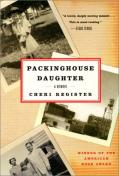BKMT READING GUIDES
Packinghouse Daughter: A Memoir
by Cheri Register
Paperback : 288 pages
1 club reading this now
0 members have read this book
A unique blend of memoir and public history, Packinghouse Daughter, winner of the Minnesota Book Award, tells a compelling story of small-town, working-class life. The daughter of a Wilson & Company millwright, Cheri Register recalls the 1959 meatpackers' strike that divided her hometown ...
Introduction
A unique blend of memoir and public history, Packinghouse Daughter, winner of the Minnesota Book Award, tells a compelling story of small-town, working-class life. The daughter of a Wilson & Company millwright, Cheri Register recalls the 1959 meatpackers' strike that divided her hometown of Albert Lea, Minnesota. The violence that erupted when the company "replaced" its union workers with strikebreakers tested family loyalty and community stability. Register skillfully interweaves her own memories, historical research, and oral interviews into a narrative that is thoughtful and impassioned about the value of blue-collar work and the dignity of those who do it.
Editorial Review
In 1959, meatpackers in the little Minnesota town of Albert Lea went on strike to demand better working conditions and higher rates of pay. The plant's owners brought in strikebreakers from nearby towns, violence ensued, the governor of Minnesota called in the National Guard, and for a few days news from Albert Lea filled papers around the United States.The incident has long been forgotten, even by many local residents. Cheri Register, who was 14 years old at the time, is one who remembers it well. In this affecting memoir of working-class life, she pays homage to her father, who worked in the plant for 31 numbing years, earning 70 cents an hour when he started, a bit more than five dollars an hour when he retired. The work was dangerous and unpleasant, but still an improvement over the alternatives, for, as she writes, "My entire family failed at farming in one of the richest stretches of the corn belt, where water was so plentiful it had to be drained away and the soil so thick that geologists could find no exposed rock."
As she recounts the strike and her father's life, Register describes how the subsequent generational conflicts of the 1960s and her own aspirations divided her family. "To be successful," she writes, "which means free from grueling labor, the children of blue-collar families must be driven from home, away from the familiar and secure." Her book is both a homecoming and a welcome contribution to labor history. --Gregory McNamee
Discussion Questions
No discussion questions at this time.Book Club Recommendations
Recommended to book clubs by 0 of 0 members.
Book Club HQ to over 90,000+ book clubs and ready to welcome yours.
Get free weekly updates on top club picks, book giveaways, author events and more








